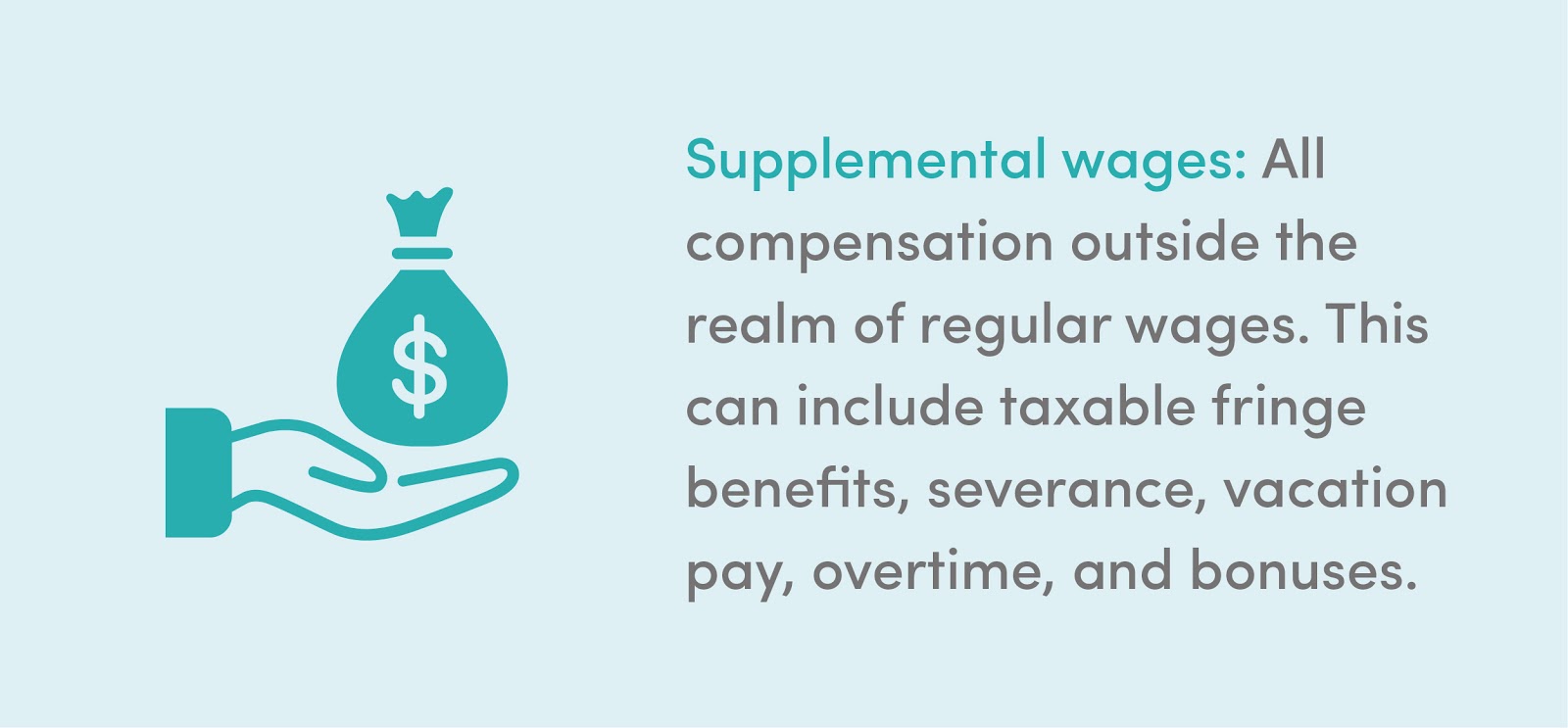Written by: Jacob Dayan
Receiving a bonus can be exciting; you have worked hard, helped your business, and now, you are getting recognized for your efforts. But, like regular income, bonuses are subject to taxation. Unlike regular income, however, the taxation rules are a little different because the IRS categorizes bonuses as supplemental wages. This article examines just how bonuses are taxed on the federal level.
All supplemental income is subject to tax rules that vary from regular income tax. According to the IRS, supplemental wages include compensation outside the realm of regular wages. These can come either from your employer or from a side job. Supplemental income from your employer includes taxable fringe benefits, severance, vacation pay, overtime — and of course, bonuses.

Supplemental wages can also come from sources besides your employer. These can come from side jobs such as independent contract work (driving for a ridesharing service, teaching, consulting, crafts, etc.) or rental income from real estate.
There are two different ways to tax bonuses: the percentage method and the aggregate method. The percentage method is more straightforward; it assesses the flat 22% tax rate standard to all supplemental wages for all bonus income up to one million dollars.

The aggregate method is slightly more complicated. Using this method, your bonus is added to your regular income and taxed at your income tax rate. If your income tax rate is below 22%, the aggregate method allows you to pay a lower tax rate on your bonus. Conversely, if your income tax rate exceeds 22%, you will have to pay a higher tax rate on your bonus; however, you may recoup the difference via a tax refund.
For an example, let’s take a look at three employees; Employee A earns $35,000 per year, while Employee B earns $100,000 per year. Their manager, Employee C, earns $165,000 per year. Employees A and B both receive a bonus of $2,000 during a specific year, while Employee C receives a $10,000 bonus.
Under the aggregate method, the bonus amount is added to their existing incomes; their yearly compensations sit at $37,000, $102,000, and $175,000 respectively. Using the 2020 guidelines for income tax rates, Employee A would only need to pay a 12% tax on their $2,000 bonus, or $240. They take home $1,760 after tax.
Employee B, however, would have to pay double — a 24% tax on their bonus, due to their income bracket. This amounts to $480; they take home $1,520. Employee B could potentially save money by using the percentage method and only paying 22% tax on their bonus, or $440. Because the difference is fairly small (only $40), they may choose to use the aggregate method and hope for a tax refund instead.
Employee C would need to pay an income tax rate of 32% on their $10,000 bonus. This amounts to a total of $3,200 — almost a third of the amount. Employee C would probably not rely on a tax refund to make the difference and would instead ask their boss to have the bonus taxed using the percentage method. For Employee C, the difference between the two methods is $1,000; they would take home $7,800 using the percentage method compared to $6,800 using the aggregate method.
If bonuses are high enough, special taxation rules apply. Let’s say the CEO of the company that employs Employees A, B, and C received a bonus of $3 million for the year. This is not unheard of; many CEOs at big companies may receive bonuses in the seven figures. If this is the case, the first $1 million is subject to the 22% flat tax. Any amount above the initial one million is then subject to the progressive bracketed income tax model.
So the CEO in this example would pay 22% of $1,000,000 plus 37% of $2,000,000 — based on the 2020 income tax guidelines. This amounts to $960,000 in taxes paid on the bonus alone.
Even if your bonus is in cash, gift cards, a vacation, or some other benefit, you will need to give the IRS their cut.

However, if your bonus qualifies as an employee achievement award, you can avoid paying federal taxes if the award does not consist of cash, a cash equivalent, and the total value of the award is not greater than $1,600.
The main difference between bonuses (supplemental income) and incentive payments is that incentive payments are actually not considered regular income on a form W-2; they are not subject to regular income tax. However, they are included on your annual tax return alongside your wages.
There are several loopholes within the tax code that taxpayers can use to their advantage. For example, if you receive a bonus, you can utilize it in an IRA or 401(k) to receive a tax break.
You can also lower your tax liability by hiring expert accountants and bookkeepers who are familiar with the monolithic tax code and all the benefits and savings within. At FinancePal, our accountants and bookkeepers have helped thousands of individuals and small businesses reach their financial goals. Schedule a consultation today!

Jacob Dayan is a true Chicagoan, born and raised in the Windy City. After starting his career as a financial analyst in New York City, Jacob returned to Chicago and co-founded FinancePal in 2015. He graduated Magna Cum Laude from Mitchell Hamline School of Law, and is a licensed attorney in Illinois.
Jacob has crafted articles covering a variety of tax and finance topics, including resolution strategy, financial planning, and more. He has been featured in an array of publications, including Accounting Web, Yahoo, and Business2Community.

Nick Charveron is a licensed tax practitioner, Co-Founder & Partner of Community Tax, LLC. His Enrolled Agent designation is the highest tax credential offered by the U.S Department of Treasury, providing unrestricted practice rights before the IRS.
Read More
Jason Gabbard is a lawyer and the founder of JUSTLAW.

Andrew is an experienced CPA and has extensive executive leadership experience.
La guía esencial para navegar por el campo de minas del contratista independiente vs. el empleado
Hoja de balance vs. Estado de ingresos (cuenta de resultados)
Discussed options for my business with Brian and he was very helpful in suggesting how best to handle it.
Contact us today to learn more about your free trial!
By entering your phone number and clicking the "Get Custom Quote" button, you provide your electronic signature and consent for FinancePal to contact you with information and offers at the phone number provided using an automated system, pre-recorded messages, and/or text messages. Consent is not required as a condition of purchase. Message and data rates may apply.
By entering your phone number and clicking the “Get Started” button, you provide your electronic signature and consent for FinancePal to contact you with information and offers at the phone number provided using an automated system, pre-recorded messages, and/or text messages. Consent is not required as a condition of purchase. Message and data rates may apply.
